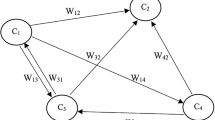Abstract
In the article a neuro-fuzzy hybrid intellectual model of risk classification and management is developed. Due to the limited capabilities of traditional methods of mathematical modeling, intelligent data analysis technologies are used to solve poorly formed problems, including risk-related problems. They are based on soft computing methods (Soft Calculation, Soft Computing) and Computational Intelligence, which is based on this theoretical and methodological basis. The main components of these directions are fuzzy sets, fuzzy logical inferences, genetic algorithms, artificial neural networks, and neural network-based computational theories. Intellectual computing technologies make it possible to obtain solutions with practically sufficient accuracy through training on the basis of limited, incomplete and qualitatively described initial data.
Access this chapter
Tax calculation will be finalised at checkout
Purchases are for personal use only
Similar content being viewed by others
References
Aliev, R.A., Aliev, R.R.: The Theory of Intellectual Systems and Its Application. Chashyolgy, Baku (2001)
Solieva, B., Juraev, Z.: Analysis of models and methods of solving problems of hybrid intelligent decision-making systems. In: Conference 2019, Fergana, pp. 278–280 (2019)
Soliyeva, B.T., Sotvoldiev, D.M.: Applied fuzzy systems for predicting the product of a cotton. In: Conference 2019, STEMM, Tashkent, pp. 132–133 (2019)
Zade, L.: Foundations of a new approach to the analysis of complex systems and decision-making processes. Math. Today 5–49 (1974)
Mukhamedieva, D.T.: Modeling of weakly formalized processes on the basis of processing of fuzzy information. Institute of Informatics of the Academy of Sciences of Uzbekistan, Tashkent (2007). (in Russian)
Mukhamedieva, D.T.: Development of fuzzy models of forecasting and optimization problems. Fan va Technology, Tashkent (2012). (in Russian)
Rotshtein, A.P.: Intellectual identification technologies: fuzzy logic, genetic algorithms, neural networks. Universum-Vinnitsa, Vinnitsa (1999)
Rutkovskaya, D., Pilinsky, M., Rutkovski, L.: Neural networks, genetic algorithms, fuzzy systems. Hot line – Telecom, Moskow (2006)
Mukhamedieva, D.T.: Development of fuzzy models of decision making tasks. Palmarium Academic Publishing, AV Academikerverlag GmbH &C.KG Heinrich-Bosking, Saarbrucken (2014)
Author information
Authors and Affiliations
Corresponding author
Editor information
Editors and Affiliations
Rights and permissions
Copyright information
© 2021 The Author(s), under exclusive license to Springer Nature Switzerland AG
About this paper
Cite this paper
Mirzayan, K., Dilnoz, M., Barno, S. (2021). The Problem of Classifying and Managing Risk Situations in Poorly Formed Processes. In: Aliev, R.A., Yusupbekov, N.R., Kacprzyk, J., Pedrycz, W., Sadikoglu, F.M. (eds) 11th World Conference “Intelligent System for Industrial Automation” (WCIS-2020). WCIS 2020. Advances in Intelligent Systems and Computing, vol 1323. Springer, Cham. https://doi.org/10.1007/978-3-030-68004-6_36
Download citation
DOI: https://doi.org/10.1007/978-3-030-68004-6_36
Published:
Publisher Name: Springer, Cham
Print ISBN: 978-3-030-68003-9
Online ISBN: 978-3-030-68004-6
eBook Packages: Intelligent Technologies and RoboticsIntelligent Technologies and Robotics (R0)




